Ten months after receiving a generous $12 million gift from author and philanthropist MacKenzie Scott, Whittier College has put into play various initiatives to ensure the College continues leading the way as a diverse, inclusive, and equitable institution of higher learning.
“I am inspired by how quickly staff and faculty acted on setting wheels in motion, proceeding to launch initiatives that were mere ideas a few months ago,” said President Linda Oubré. “So often, potential and great ideas are hampered by fiscal realities. The Scott gift has reenergized Whittier College to think big and boldly, allowing us to make significant progress toward creating a more equitable, just, and sustainable future for our students, their families, and the greater community.”
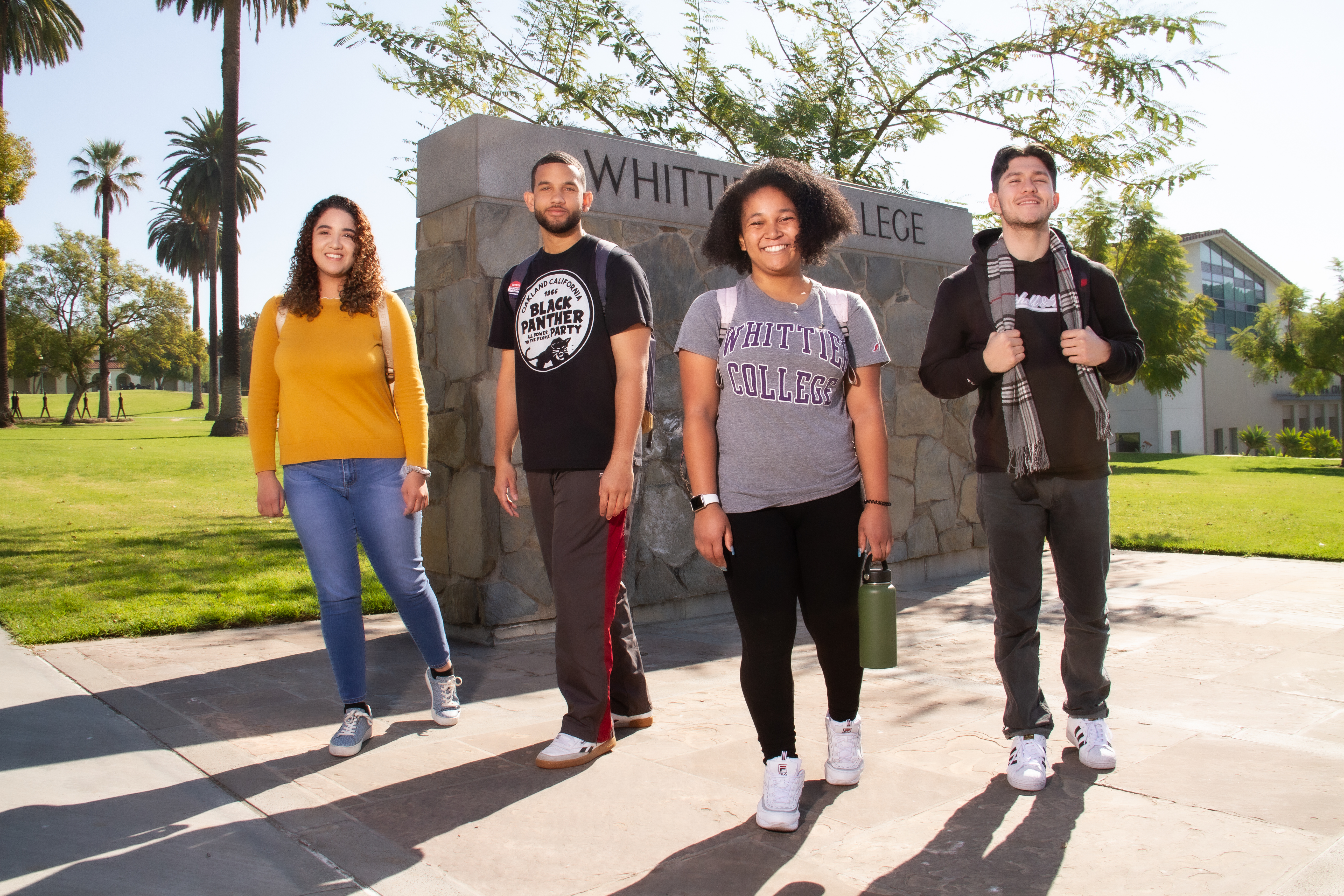 Success Scholarship
Success Scholarship
The Success Scholarship, funded by the Scott Grant, was established to reward and support continuing third- and fourth-year students who have been at Whittier College since their first year of undergraduate education. The Success Scholarship fund was allotted $1 million per year for five years (starting in 2021).
Eligible students had to complete a Free Application for Federal Student Aid (FASFA) by the designated deadline, have an unmet financial need of at least $200, and have an annual Family Adjusted Gross Income of $100,000 or less. Typical awards ranged from $2,000 to $5,000.
For the 2021-22 academic year, 280 students (142 seniors, 138 juniors) received a Success Scholarship. The total amount awarded was $984,680. In January 2021, an additional $1mil in scholarships were awarded to 194 continuing students whose family’s adjusted gross income is less than $50,000.
“Being able to provide additional scholarships to a significant portion of our student body has made a big difference, especially as we see the financial impact that the pandemic has had on the families of many of our students,” said Vice President of Enrollment Falone Serna.
According to a recent report from the Office of Institutional Research, the Success Scholarships program has already demonstrated a positive effect on student retention—the current year has seen the best retention rate in five years.
Scott Grant Internship Program
With the goal of supporting student success and career development, Whittier has established the Scott Internship Program—on-campus professional paid student internships. More than 25 new internships have been established in 15 departments across campus, including marketing and communications; student life; admission; alumni relations; registrar’s office; departments of religious studies, economics, and English; and the president’s office, among others.
The internship program—run by the Center for Career and Professional Development (CCPD) and the Human Resources Office—was designed specifically in consideration of students who may not have the opportunity to participate in off-campus internships due to work and family obligations outside of class. The goal is to provide a real-world professional experience, build career readiness competencies, and help students cover the cost of their education.
“These internships promote and encourage student growth in key professional areas such as communication, problem-solving and critical thinking, leadership, professionalism, and teamwork, to name a few,” explains CCPD Director Sandra Arana. “Working with potential employers over the last few years, I know how important internships are to ensuring that our students can secure meaningful career opportunities after graduation.”
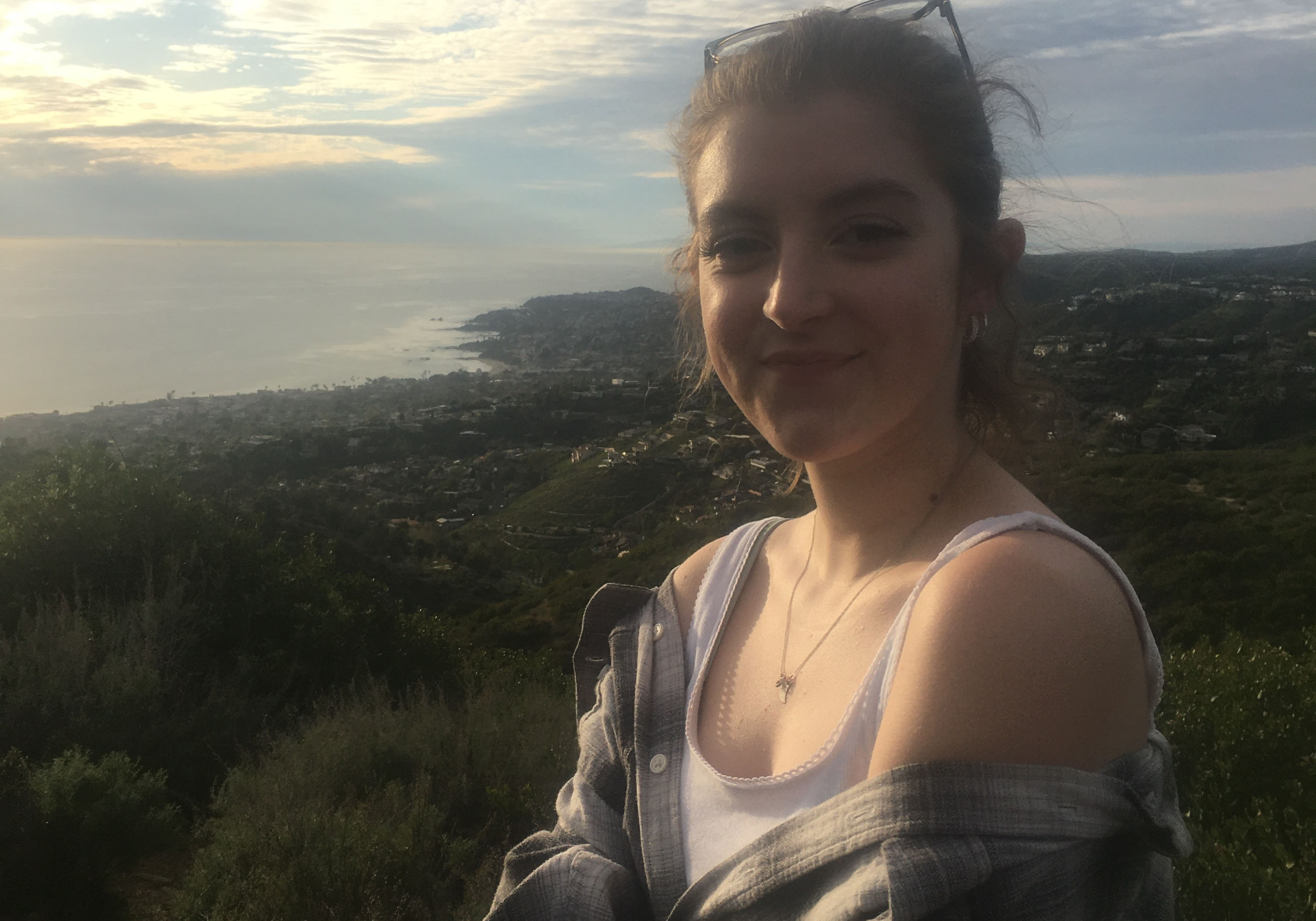 Business administration and digital design double major Miyo Solange Park ’22 was looking for an internship that allowed her to combine her two passions, graphic design and marketing, in a “nurturing and supportive environment.”
Business administration and digital design double major Miyo Solange Park ’22 was looking for an internship that allowed her to combine her two passions, graphic design and marketing, in a “nurturing and supportive environment.”
“It's a dream opportunity for me,” said Park, who is the Graphic Design Scott Intern in the Office of Marketing and Communications. “It represents a chance for me to take a step toward the future I want to have and build my portfolio both professionally and personally.”
Park, who grew up all along the Eastern Seaboard and the Midwest, has the ultimate career goal of being the creative director at Patagonia, a socially responsible outdoor gear and clothing company. “I love everything they stand for, and they inspire my work in everything I do. This internship will give me significant work experience that I can use when I graduate and enter the workforce full time.”
Our Shared History Project
History professor Laura McEnaney is leading the Our Shared History Project to unearth the untold history of Black alumni and culture at Whittier College. The Scott Grant supports two paid student interns who will be involved in all phases of this exciting project. The interns include English and Global & Cultural Studies double major Jai Battle ’23 and sociology major Jayson Smith ’23. History major Danni Salinas ’22 is a third member of the team who was the first to come on board completing the internship for academic credit.
To say Salinas was enthusiastic about taking on this internship is an understatement. “I couldn't say yes fast enough!” she said. “I believe completely in emphasizing marginalized, unheard voices that can help us make sense of not only the past but the current world we find ourselves living in. This project is doing exactly that.”
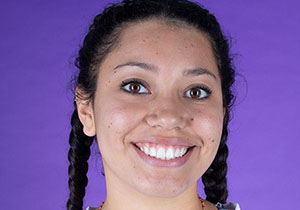 For Battle, this project was a chance to delve into the past. “It has been so cool to travel back in time and look through WC history!”
For Battle, this project was a chance to delve into the past. “It has been so cool to travel back in time and look through WC history!”
At the same time, she sees it as a way to tell stories that have often been overlooked. “The opportunity to record oral history seemed so special to me, not only because of this project's commitment to amplify Black voices, but to allow the Black alumni of Whittier College to tell their story, in their own words.”
McEnaney and the student team have been meeting regularly to plan and undergo training in oral history methods. Part of this training was done through CSU Fullerton’s Center for Public History.
The group has also worked together to create the questions and protocols for the upcoming interviews. Six oral history interviews will be completed by the end of the fall semester. Salinas is looking forward to beginning this process.
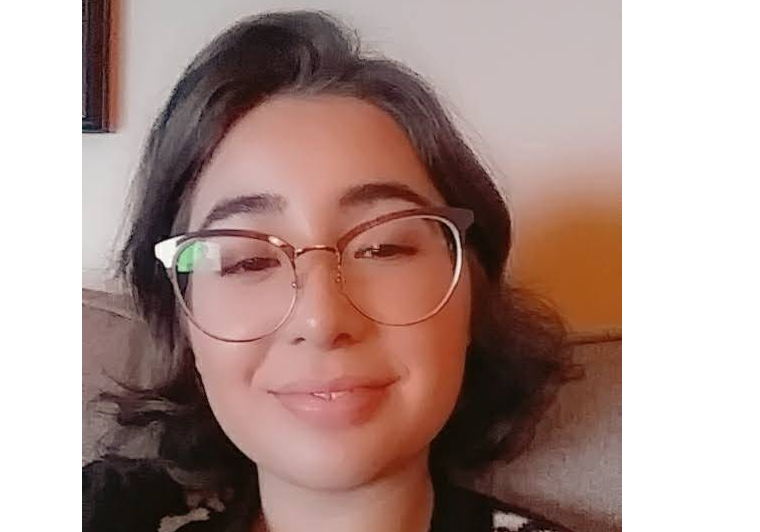 “What stands out in my research so far is Mr. Stan Sanders, Class of 1963. He was the second Black student in history to receive a Rhodes Scholarship,” explained Salinas. “Mr. Sanders' selection came 56 years after the first Black student's selection, Alain LeRoy Locke, in 1907. Considering the historical and social context of the time, this is an amazing, monumental achievement—one in which I'm excited to hear more about from Mr. Sanders, himself.”
“What stands out in my research so far is Mr. Stan Sanders, Class of 1963. He was the second Black student in history to receive a Rhodes Scholarship,” explained Salinas. “Mr. Sanders' selection came 56 years after the first Black student's selection, Alain LeRoy Locke, in 1907. Considering the historical and social context of the time, this is an amazing, monumental achievement—one in which I'm excited to hear more about from Mr. Sanders, himself.”
More interviews will be conducted in the spring. The team has partnered with the Whittier College Black Alumni Association and the Office of Alumni Relations to identify subjects for the first round of interviews.
Bayard Rustin Fellowships
Two new scholars joined the Whittier College faculty this fall as part of the Bayard Rustin Fellowship, a multi-year program aimed toward diversifying the faculty body and creating structural change to the College's academic practices via a lens on equity.
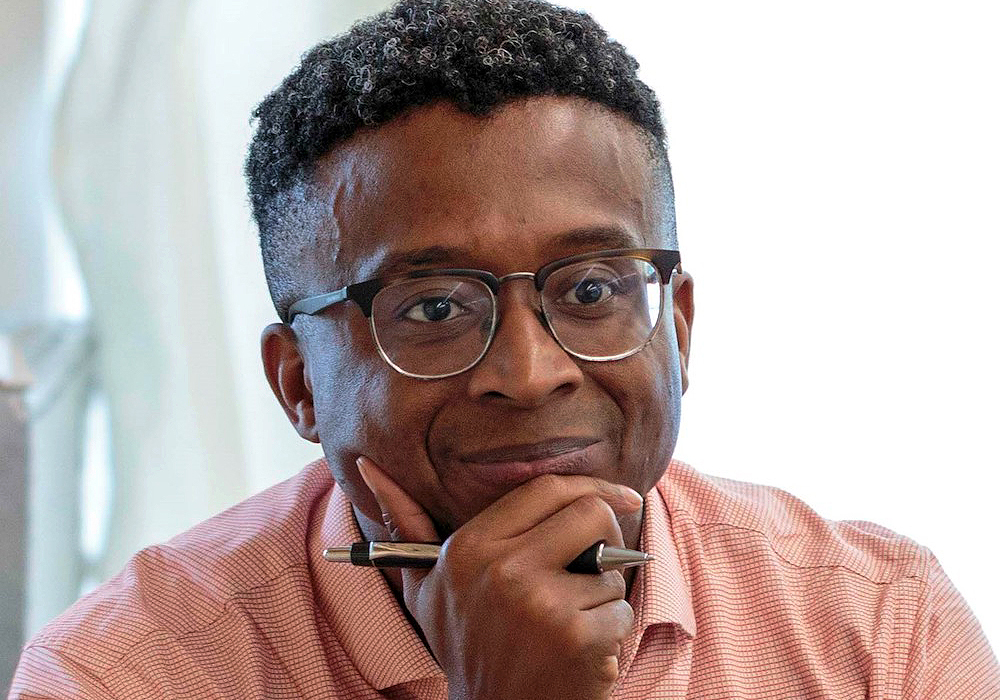 Poet Douglas Manuel was hired as a Fellow within the English Department and is currently teaching courses in creative writing.
Poet Douglas Manuel was hired as a Fellow within the English Department and is currently teaching courses in creative writing.
“It really means a great deal to me to work for an institution that has minoritized students as the majority and has leadership that looks like members of my family,” said Manuel. “This centering and attention to diversity, equity, and inclusion really made me want to be a part of the Whittier family.”
“Each day in my classes, Whittier students delight me with their hard work and dedication, deep and empathetic reading strategies, openness to challenging and uncomfortable discourse, and commitment to excellence. Whittier students are the exact type of students I want to work with, learn from, empower, and prepare for the future.”
Much of Manuel’s poetry is autobiographical – dealing with family, identity, and issues faced by a young black man growing up in the United States of the 1980s. His first collection of poems, Testify, won an IBPA Benjamin Franklin Award for poetry, and his poems and essays can be found in numerous literary journals, magazines, and websites, most recently Zyzzyva, Pleiades, and the New Orleans Review.
“Besides being a creative writer… my scholarship focuses on the New Negro Movement, Black Modernism, and the Harlem Renaissance with a direct focus on [poet and novelist] Jean Toomer,” added Manuel. “In many ways, I feel as though this historical moment rhymes with our own. So much of my work is also about connecting the themes of that era to our contemporary one.”
“The Bayard Rustin Fellowship gives me the opportunity and space to convert and edit my dissertation, How Does it Feel to Be a Problem: Revisiting Cane and the Life of Jean Toomer, into a hybrid text of poems, short stories, lyric and personal essays about Jean Toomer, America then and now, and myself.”
Manuel is also planning a trip to Chiapas, Mexico with the Borchard Foundation Center on Literary Arts this upcoming January. There, he hopes to begin a poetic translation project as well as “find inspiration” for his third book of poetry.
Manuel received a bachelor’s degree in creative writing from Arizona State University, an MFA in poetry from Butler University, and a Ph.D. in English literature and creative writing from the University of Southern California.
Read a recent interview with Manuel in the Quaker Campus.
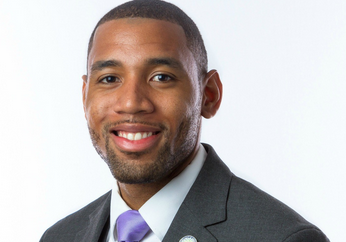 Daniel Harris was hired as a research fellow within academic affairs to conduct research focused on equity within the higher education liberal arts environment. He is working closely with Associate Dean of Diversity, Equity, & Inclusion Kay Sanders and departments across campus to inform change and facilitate best practices in inclusive and equitable pedagogies for higher education.
Daniel Harris was hired as a research fellow within academic affairs to conduct research focused on equity within the higher education liberal arts environment. He is working closely with Associate Dean of Diversity, Equity, & Inclusion Kay Sanders and departments across campus to inform change and facilitate best practices in inclusive and equitable pedagogies for higher education.
“As a small, yet bountiful liberal arts institution located in the bustling county of Los Angeles, I admired Whittier College's courage to inspire change and take on issues of equity and inclusion at the College,” said Harris. “In my role as the inaugural Bayard Rustin Institutional Research fellow, I have been impressed by the College's urgency and resiliency to promote a better tomorrow for students, faculty, and staff.”
Harris has more than seven years of research experience in student and faculty of color experiences in K-12 and higher education. He enjoys designing, planning, managing, executing, and evaluating education programs designed to support student recruitment, retention, success, and career preparation. Immediately before coming to Whittier College, Harris served as managing director for Teach for America, leading organization-wide data collection, reporting, and strategy in service of the community, teacher development, and student outcome goals.
“My academic research explores how Black, Indigenous, and other People of Color resist the everyday anti-Blackness and colonization they experience to and through college, and the potential for structural and systemic change to address gaps in equity and opportunity,” added Harris.
Harris has a bachelor’s degree in psychology from Georgetown University and a master’s degree in sociology and education with a specialization in policy studies from Teachers College of Columbia University. He then earned a master’s degree and a Ph.D. in Higher Education and Organizational Change from UCLA.
"The fellowship, named in honor of Bayard Rustin, a civil rights leader, activist, writer, Quaker, and pacifist, is an incredible opportunity for our community to act on the values of our Quaker founders, articulated by our President in the strategic plan, and specifically reinforced by the Racial Justice and Equity Action Plan," said Associate Dean of Diversity, Equity, and Inclusion Kay Sanders.
The Fellowship is for one year beginning in Fall 2021 with the potential to renew for a second, pending favorable review. Rustin Fellows are also eligible for tenure-track consideration, pending budgetary and administrative approval.
Student Wellness
Even before COVID-19 became a household word, Whittier College had begun looking for ways to better support its students in the area of mental health. The pandemic has created a greater need, thus a greater resolve by the College to provide the needed counseling and support services for students.
With the support of the Scott Grant, the Student Counseling Center created a Peer Health Educator (PHE) program designed to address an equitable health model for all students, with attention given to programming that specifically impacts students from historically underrepresented identity groups.
Five paid student interns have been hired for the PHE. The peer educators are currently in training and will carry out a public health campaign on campus focused on mental health and wellbeing, using various mediums including video, social media, and on-campus events.
PEER HEALTH EDUCATOR PROFILES
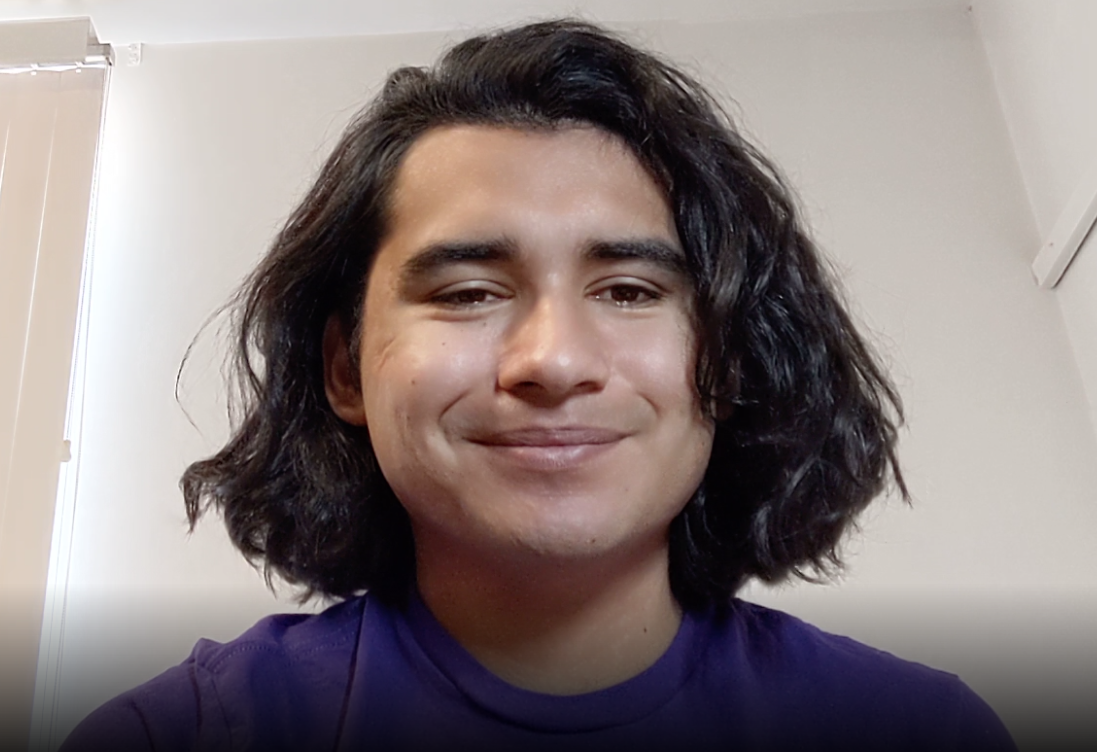 Biology major Fernando Ramirez’s ’24 ultimate career goal is to be a primary care doctor working with underserved populations.
Biology major Fernando Ramirez’s ’24 ultimate career goal is to be a primary care doctor working with underserved populations.
“I have a very big interest in public health and health prevention,” he said. “I saw the PHE program as a means to get experience with addressing larger communities and their health needs, tackling issues before they become larger concerns.”
The internship has helped Ramirez gain a wider perspective on health and wellbeing. “The program has also helped me see how folks are affected by physical and psychological needs as well as the necessity of more community education about all aspects of health.”
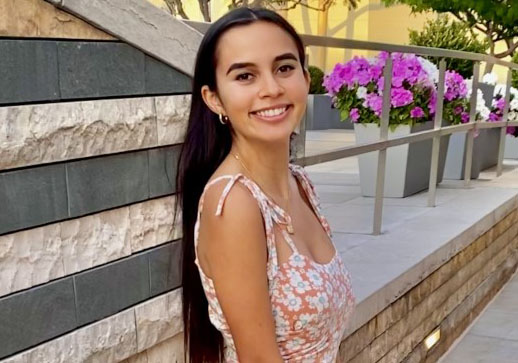 Kinesiology major Hannah Gevirtzman ’23 is also aiming for a career in health care as a wellness coordinator.
Kinesiology major Hannah Gevirtzman ’23 is also aiming for a career in health care as a wellness coordinator.
“I chose this internship because I’m really passionate about helping other people with their well-being. It’s something I believe should be promoted more on campus,” she said.
Ultimately, the internship will also help her gain the skills she needs for a professional position in the healthcare industry. “It gives me more hands-on experience addressing health awareness and attitudes that I think are important tasks for the career I’m pursuing.”
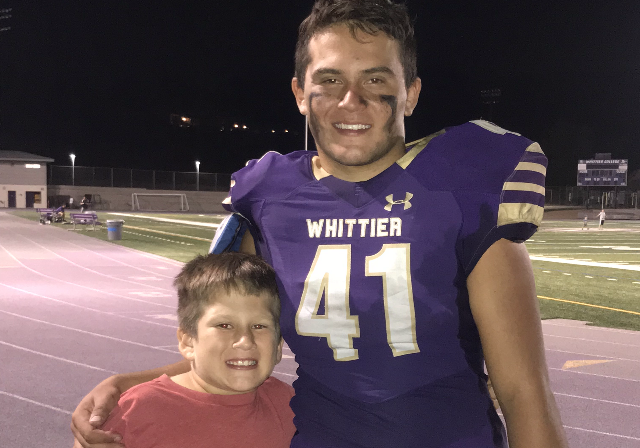 History major and football player Jacob Hayes said that becoming a peer educator was an opportunity to help the Whittier community “by promoting greater access to and awareness of health services” on campus.
History major and football player Jacob Hayes said that becoming a peer educator was an opportunity to help the Whittier community “by promoting greater access to and awareness of health services” on campus.
Hayes, who finds balance working out on the football field, has found a deeper understanding of health care. “I think by bettering myself as an individual, I can work to share my understanding of more holistic health in a career where it might not typically be talked about.”
The Gender Equity Center (GEC) and the Title IX office have also recruited student interns to serve as peer educators. The GEC peer educators will focus on helping the community better understand gender dynamics and how gender impacts the experiences of all students. The Title IX intern will focus on prevention efforts, public education using a trauma-informed approach, and educating the community on bystander intervention approaches. The overall aim of both these programs is the prevention of gender violence, as well as purposeful education and prevention training.
Peer-to-peer support is a demonstrated best practice for public health education. Likewise, one-on-one support for underserved students is a proven tactic to improve retention and overall academic success.
The Office of Equity and Inclusion (OEI) is implementing this model to support young Black men on campus. A new addition to the Brotherhood Leadership Program is the Black Male Initiative. The Black Male Initiative is a collaborative support model in partnership with the Office of Equity and Inclusion, Dean of Students, and Athletics. Both programs are designed to create spaces for men of color to come together and find the needed community and encouragement to support their academic success and overall positive college experience.
Moving Forward
To maximize the impact of the Scott Grant, a portion of the $12 million award will be spent every year through at least 2025—continuing to allocate $1 million a year for student scholarships. Moreover, fundraising efforts will focus on making the Scott Fund sustainable for years to come.